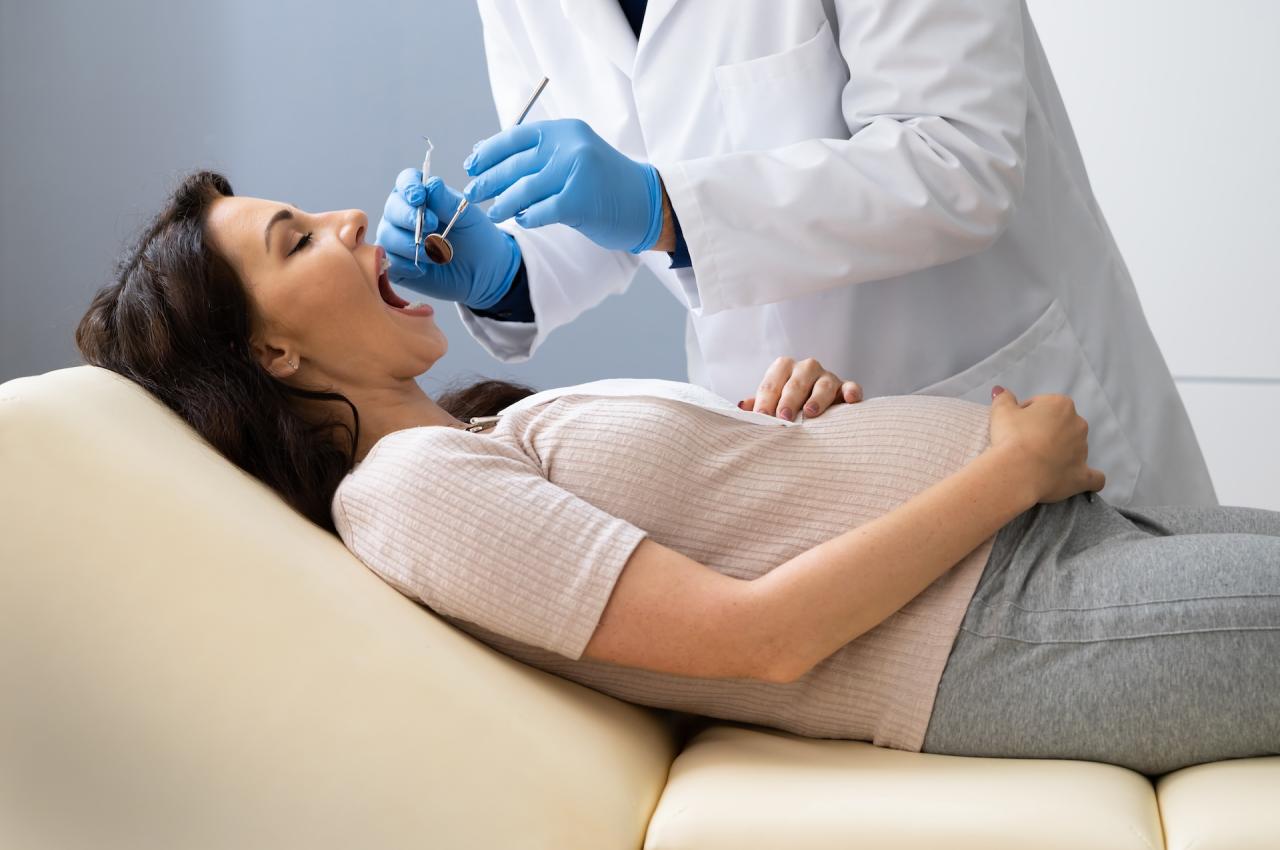Yes, It’s Safe to Go to the Dentist When You’re Pregnant
In 1883, the American Journal of Dental Science dedicated an entire issue to pregnancy and oral health. “And a lot of the doctors said, ‘It’s no problem. I treat pregnant patients all the time,’” recounts David Leader, D85, MPH13, director of dental practice and operations at North Shore Community Health Centers in Salem, Massachusetts. But a few of the dentists shared a different story.
One, Dr. Jonaston, said he had treated a woman who was six or eight weeks pregnant. She had a decayed molar with an abscess protruding from the root and Jonaston lanced the abscess. Within 24 hours, the woman miscarried. “So these apocryphal tales—the rare times that someone associates a negative outcome with a pregnancy—tend to stick in people’s minds,” Leader says.
It’s been more than 140 years since the publication of Jonaston’s story, yet misinformation about pregnancy and dental care persists.
That prevents many pregnant people from seeking care that’s essential to a healthy pregnancy, for them and their developing baby. An underlying fear of “unwittingly causing an issue,” for a pregnant patient still drives many dentists’ decisions around caring for pregnant patients, says Leader, a former longtime faculty member at Tufts University School of Dental Medicine and an adjunct associate professor at Tufts University School of Medicine.
“It’s hard to find a dentist who will take on a new patient, if the patient is pregnant,” he says, due to concerns about lawsuits.
False, Untrue, Misguided
According to a pregnancy risk assessment published in the Journal of the American Dental Association (JADA) this past March, this reticence could affect more than teeth and gums. The assessment found that pregnant women who don’t receive preventive oral care were slightly more likely to develop gestational diabetes and high blood pressure than those who received oral care. It also revealed that pregnant women who didn’t seek care for dental problems were likelier to develop pregnancy-related blood pressure disorders than women without dental problems.
Some dental care providers still ask all pregnant people for a letter from their medical doctor clearing them for dental care—a practice that is outdated, says Matthew Horan, D08, dental director of the Massachusetts Office of Oral Health and adjunct faculty at TUSDM.
Meanwhile, many people hear stories from family, friends, and even some doctors that make them question dental care while they’re pregnant.
“We know today that these myths are false, that some of the advice from friends and family is untrue, and that some medical and dental health care professionals may be misguided,” Horan says. Even dental X-rays, still sometimes considered harmful to a fetus, are known to be safe.
“These persisting misconceptions are likely contributing to the ongoing challenge of poorer overall maternal health outcomes,” Horan says.
Encouraging Partnership
In fact, Leader urges people to tend to their oral health before getting pregnant, if possible. If it’s not, Horan says, “I would encourage pregnant people to make an appointment with an oral health professional as soon as possible and share their pregnancy status when scheduling.”
Pregnancy keeps the human body busy over the course of nine months. That activity includes the many hormonal shifts that increase a person’s risk of developing oral disease, including gingivitis and benign pyogenic granulomas, also known as pregnancy tumors. “There is a correlation between periodontal disease and early-term birth and low birth weight” Leader says. That means that what affects the mother also affects the baby.
These problems don’t affect everyone equally. “Pregnant people from racial and ethnic minoritized groups and those insured by Medicaid have higher rates of [cavities] and periodontal disease (and are more likely to enter pregnancy with oral disease) but report lower rates of prenatal oral health care,” according to a guest editorial in JADA co-written by Chloe Bird, the Sara Murray Jordan Professor of Medicine at TUSM.
“Adults who are low-income, non-Hispanic Black, and have no health insurance coverage are twice as likely to have untreated cavities or gum disease with bone loss than comparison groups,” Horan adds. Some of the reasons include a lack of available dentists, living in a remote area, fear of the dentist, and financial concerns. These differences primarily exist because of structural racism within our society and systems and can ultimately shape health outcomes such as maternal health indicators, he adds.
One solution was proposed in 2013, when the American Dental Association endorsed the American College of Obstetrics and Gynecology’s call for increased attention to prenatal oral health. Massachusetts has developed oral health guidelines for pregnancy and early childhood to foster collaboration between dentists and physicians. Leader was part of the group that created the original guidelines in 2014—they were updated in 2024—and four other states have undertaken similar steps.
Bird and her coauthors urge doctors and dentists to promote oral health care for their pregnant patients. They hope prenatal care providers will include oral health questions in their patient screening questionnaires. Such questions “should be as integrated into prenatal health as HIV testing, smoking cessation, and nutritional counseling,” they write.
More collaboration among healthcare professionals improves maternal health outcomes by keeping people healthy and efficiently connecting people to care and information, Horan says. “It’s all about prevention,” he says.
Latest Tufts Now
- A ‘Spa Day’ for Bess the RhinoMonths of conservation work honor both the beloved SMFA at Tufts sculpture and the alumna artist who created her
- On the Road to Quantum ComputingTufts is part of a team that received a $4 million National Science Foundation grant to advance design of a quantum computer for complex scientific research
- Does Chewing Ice Hurt Your Teeth?If it’s a habit, it might indicate underlying health problems, and isn’t great for your smile, a dental professor says
- New Kosher Dining Options Uplift Jewish Student LifeUndergraduates and alumni celebrate a comprehensive new menu of hot kosher meals served at Dewick-MacPhie Dining Center
- One in Three Young Adults Skip the Dentist, and That’s a ProblemA new study reveals how barriers to oral health differ across generations, putting young adults at greater risk for future health problems
- The Darker Side of CollaborationA Fletcher School professor unpacks why partnerships often falter and what it takes to build alliances that last













